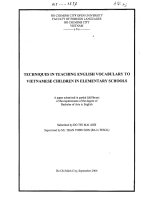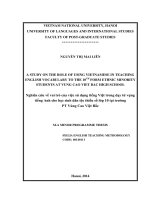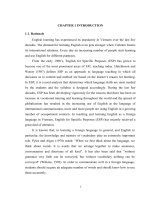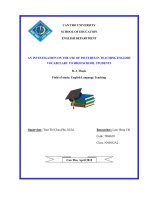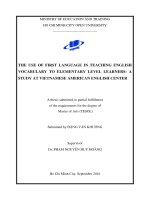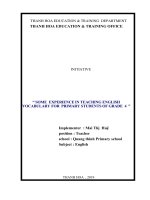USING GAMES IN TEACHING ENGLISH VOCABULARY TO PRIMARY SCHOOLS STUDENTS
Bạn đang xem bản rút gọn của tài liệu. Xem và tải ngay bản đầy đủ của tài liệu tại đây (2.83 MB, 95 trang )
1
MINISTRY OF EDUCATION AND TRAINING
VINH UNIVERSITY
DANG THI PHUONG THAO
USING GAMES IN TEACHING ENGLISH
VOCABULARY
TO PRIMARY SCHOOLS STUDENTS
Major: Teaching English to Speakers of Other Languages (TESOL)
Code: 60 14 01 11
MASTER’S THESIS IN EDUCATION
SUPERVISOR:
Assoc.Prof.Dr.Ngo Dinh Phuong
2
Nghe An, 2017
i
STATEMENT OF AUTHORSHIP
I hearby acknowledge that this study is mine. The data and findings
discussed in the thesis are true and have not published elsewhere.
Author
Dang Thi Phuong Thao
ii
ABSTRACT
The study attempted to examine effects of using games in teaching
vocabulary for primary schools students. It aims to find out students’s
difficulties in learning this comprehensive skill, their expectations of teacher’s
methodology as well as their attitude towards using games.
Both qualitative and quantitative research methodology were utilized in
this study. The data was collected through the proficiency pretest and posttest,
questionnaires, interviews. The participants of the research include eighty six
students, forty two females and forty four males at Vinh Univerity Pedagogical
Practice School in Nghe An Province were selected and assigned into two
groups.
Learning is one of the primary activities of students in the classroom.
Successful learning is only on the right way to lead the process. Good learning
atmosphere and method can guide the students to learn more meaningful. To
accomplish such conditions, teachers must create various and attractive methods
for the class.What should a teacher do if their students get bored? Using varitype
games can be an alternative solution to handle this problem. Games, as a matter
of fact, can help and encourage many students to sustain their interest and work.
By this paper, the writer wants to share experiences about “how effective games
to teach English vocabulary”.
One of the best ways of doing this is through games. Games can help the
teachers to create contexts in which the language is useful and meaningful. In
the whole process of teaching and learning by games, the students can take part
widely and open-mindedly. To win the games each student or group should
competitively answer the questions addressed by the teacher or other students or
groups. In order to do so they must understand what the teacher or others are
iii
saying or have written, and they must speak or write in order to express their
own point of view or give information The English instruction in elementary
school is intended to endorse the mastery and development of the four basic
abilities and skills. The need to use various instructional media will be able to
help students to increase their English vocabulary. Teaching vocabulary is
clearly more than just presenting new words. It also includes a decision that
words should teach the basic of how frequently they are used by speaker of the
language. The words are most commonly used are those a teacher should teach
first. But commonly and usually the way of teaching makes the students lazy
and bored. The teacher needs something different to make students interested,
because mostly students are very easy to get bored. Therefore, teacher needs
something interesting which can make motivate them. It is based on the
characteristics and attitude of the children that they are curious and often seek
something that the teacher notices them and shows appreciation for what they
are doing. So, to motivate them teacher needs something new that can stimulate
their curiosity. With the current analysis on communication in teaching
language, using games appears to hold a solution for many teachers. The
communication activities somehow involves in a varied use of language. It had
been found in many schools that teachers use games activities as their teachingaid. The students really appreciate any kind of activities which provide
excitement and fun. It will be easy to understand and practice English. The
writer chooses games as the simple illustrated media to facilitate students’
method of learning, as we know children learn while playing games.
It is easy to be understood and comprehended by students. However,
learning English vocabulary using games has an important role for elementary
teachers and students. The first, as students, they have strong and good
motivation to deepen English language. The second, they are easy to accept the
iv
English language because they learn by playing game. The third, teaching
English vocabulary using games can help teacher in teaching learning process.
Finally, they (teacher and students) can teach and learn English vocabulary using
games.
v
ACKNOWLEDGEMENTS
Above of all, I would like to express my deepest thanks to my beloved
supervisor Associate Pro.Dr. Ngo Dinh Phuong for his invaluable support,
patient guidance and encouragement he gave me and my research.
I also wish to send my sincere thanks to the students of the classes I
taught in order to experiment amd gather information for my survey questionaire
and interview. Without their enthusiastic contribution, this study could not have
been successful.
I am indebted to my friends, my classamates, as well as my colleagues for
their invaluable comments and criticism and also for their continued interest and
encouragement.
Last but not least, I would like to express my gratitude to my family
members who are always beside me, creating favorable conditions and
supporting me both spiritually and materially to complete this thesis.
vi
TABLE OF CONTENTS
STATEMENT OF AUTHORSHIP..............................................................i
ABSTRACT..........................................................................................................ii
ACKNOWLEDGEMENTS..................................................................................v
CHAPTER I: INTRODUCTION..........................................................................1
1. Rationale............................................................................................................1
2. Aims of the study..............................................................................................4
3. Scope of the study.............................................................................................4
4. Research Questions...........................................................................................4
5. Significance of the study...................................................................................5
6. Organization of the study.................................................................................5
CHAPTER 2: THEORETICAL BACKGROUND...............................................6
I. Introduction........................................................................................................6
II. Literature review...............................................................................................6
III. Theoretical Background..................................................................................9
3. Vocabulary.........................................................................................................9
3.1. Definition of vocabulary..............................................................................10
3.2. Types of vocabulary......................................................................................11
3.2.1. Listening Vocabulary.................................................................................11
3.2.2. Speaking Vocabulary.................................................................................11
3.2.3. Reading Vocabulary...................................................................................11
3.2.4. Writing Vocabulary....................................................................................12
3.2.5. Receptive vocabulary................................................................................12
3.2.6. Productive vocabulary...............................................................................13
3.2.7. Active vocabulary......................................................................................13
vii
3.2.8. Passive vocabulary....................................................................................13
3.3. The importance of vocabulary......................................................................13
3.4. Games to teach vocabulary in primary schools............................................15
3.4.1. Games........................................................................................................15
3.4.2. The effects of using games on English vocabulary learning.....................15
3.5. Psychology features of primary students......................................................17
3.5.1. Social and emotional development............................................................17
3.5.2. Intellectual development:..........................................................................18
3.6. How to teach vocabulary in games to primary students:..............................19
CHAPTER 3: METHODOLOGY.......................................................................22
1. Introduction.....................................................................................................22
2. Research methods............................................................................................22
3. Participants......................................................................................................23
4. Research Instruments......................................................................................23
4.1. Vocabulary pretest:.......................................................................................24
4.2. Interviews.....................................................................................................24
4.3. Questionnaires..............................................................................................25
4.4. Vocabulary Posttest......................................................................................26
4.6. Lesson Plans.................................................................................................27
5. Data Analysis...................................................................................................27
6. Data Collection Procedures.............................................................................27
7. Summary.........................................................................................................28
CHAPTER 4: FINDINGS AND DISCUSSIONS...............................................29
1. Introduction.....................................................................................................29
2. Student’s interest in learning English ( Question 1, Appendix)......................29
3. Teachers’ and students’ opinion toward the role of English vocabulary:........30
viii
4. Students’ and teachers’ difficulties in learning and teaching vocabulary.......31
4.1. Students’ difficulties to memorize the new words in a lesson (Question 3,
question 4, appendix 1).......................................................................................31
4.2. Teachers’ opinion on the difficulties their students can face while learning
vocabulary (Question 6, appendix 2)..................................................................32
4.3. Teachers’ difficulties when teaching vocabulary for primary students
(Question 5, appendix 2).....................................................................................33
4.4. The teachers’ and students’ opinion on currently used techniques in learning
vocabulary. (Question 6, appendix 1 and question 3, appendix 2)......................34
5. Tips are applied to help learning English vocabulary.....................................35
5.1. The ways students often apply in memorizing words..................................35
5.2. The tips teachers use to help their students memorizing new words in class
.............................................................................................................................37
6. The comparision of efficiency between games and other techniques in
teaching vocabulary.............................................................................................38
7. Effects of games on student’s vocabulary.......................................................39
7.1. Effects on vocabulary test results.................................................................40
7.2. Effects on students’s motivation...................................................................45
8.Some suggested games in teaching English vocabulary in primary schools in
Nghe An...............................................................................................................46
8.1. Crossword.....................................................................................................46
8.2. Word order....................................................................................................48
8.3. English quiz..................................................................................................48
8.4. Word search..................................................................................................51
8.5. Guess the word.............................................................................................52
8.6. Call My Bluff / Two Truths and A Lie..........................................................53
8.7. Erase a Word.................................................................................................53
8.8. Hangman......................................................................................................54
ix
8.9. The Mime.....................................................................................................54
8.10. Simon Says.................................................................................................55
9. Pedagogical Implications................................................................................56
9.1. For teachers:.................................................................................................56
9.2. For students..................................................................................................58
9.3. For school administrators.............................................................................58
10. Summary.......................................................................................................59
CHAPTER 5: CONCLUSION............................................................................60
1. Summary of the key findings..........................................................................60
2. Limitations of the study...................................................................................61
3. Suggestions for further research......................................................................61
REFERENCES....................................................................................................63
1
CHAPTER I: INTRODUCTION
1. Rationale
No one denies the importance of English language in the present time as
global language. It is clear that English has become more and more dominant
around the world. Actually, in some countries it is used as the mother tongue and
other countries learn it as second language in their schools. There is no doubt
that English is the language of communication between the people from
different cultures. Moreover, English is the language of science and technology.
It is also the language of computers that help to integrate the people around the
world via Internet technology and e-mail. Needless to say, people who know
English can deal with the Internet. Therefore, the need of mastering a foreign
language especially English, is becoming more and more necessary. English is
now taught in many primary schools all over the world and chidren from a very
early age experience an English lesson as part of their daily rountine. When they
make an effort to use English, they need to be encouraged so that they will enjoy
the experience of communicating in this new language.
Research suggests that vocabulary is enormously important to children’s
development, especially in reading. Research clearly indicates that children with
larger vocabularies have higher school achievement in general (Smith, 1941,
cited in Beck, McKeown, and Kucan, 2002). In fact, people with larger
vocabularies even have higher IQs ( Bell, Lassiter, Matthews and Hutchinson,
2001; Hodapp and Gerken, 1999)!
Vocabulary is central to English language teaching because without
sufficient vocabulary students can not understand others or express their own
ideas. Wilkins (1972) wrote that “….while without grammar very little can be
conveyed, without vocabulary nothing can be conveyed”. Students often
2
instinctively recognize the importance of vocabulary to their language learning.
As Schmitt (2010) noted, “learners carry around dictionaries and not grammar
books”. Teaching vocabulary helps students understand and communicate with
others in English. Voltaire purportedly said “Language is very difficult to put
into words”. Vocabulary, much more than grammar, is the key to your child
understanding what she hears and reads in school and to communicate
sucessfullly with other people. For this reason, it is very important for her to
quickly build up a large store of words. Research studies have shown the strong
links between having an extensive vocabulary and achieving school success.
Learning vocabulary through games had attained a lot of attention.
Donmus (2010) believed that "The value of educational games has been
increasing in language education since they help to make language education
entertaining "(p.1497). According to Kuzu and Ural findings (as cited in
Donmus, 2010, p.1499) "when games and education are combined, it can be
educative and education environments can be entertaining. The learners who
learned with the use of games, gain positive attitudes and can be more motivated
while learning". This is a review of the effects of using games on learning
vocabulary in English as a foreign language (EFL).Vocabulary in English is
mostly taught out of context as isolated words, the main criticism of this way of
teaching is that vocabulary cannot be learnt in isolation The Effects of Using
Games on English Vocabulary Learning 40 (Al Neyadi, 2007). Activities which
involve learners in thinking about the words, like using games allow learners to
remember the target words more easily. Learning vocabulary is a hard work, so
attempt is required to understand, produce and manipulate the target words.
Games help and encourage many learners to learn target language more easily.
They also help teachers to create contexts in which the target words are useful
and meaningful; they also bring fun for students, thus help them learn and retain
3
new words more quickly. In other words, game-based learning can create a
meaningful context for language learning process. After learning and practicing
new vocabulary through games, students have the opportunity to use language in
a nonstressful way (Uberman, 1998). Games are advantageous and effective in
learning vocabulary. They are motivating because they usually involve friendly
competition and create cooperative learning environment, so students have an
opportunity to work together. They improve students’ communicative skills and
they have a chance to use the target language (Sorayaie- Azar, 2012).Therefore,
vocabulary games bring real world context into the classroom, and enhance
students' use of English in a flexible, communicative way. The role of games in
teaching and learning vocabulary cannot be denied. However, in order to
achieve the most from vocabulary games, it is essential that suitable games be
chosen. Whenever a game is to be used, the proficiency level and cultural
background of the students should be taken into account, and also it should be
useful for students with lower language ability and should be easily applied in
the class. Many experienced textbook and methodological manual writers have
argued that games are not just time-filling activities but have a great educational
value (Riahipour & Saba, 2012). This paper offers the rationale for
implementing games as a stress-free tool of learning words. It is believed that
games can have the potentiality to contextualize learning words.
I have worked as a teacher at Vinh university Pedagogical Practice School
for two years. I found that learners face serious problems in remembering the
vocabularies, they are unable to memorize them. They may read the words but
they can not know how to write them correctly. Moreover, they find themselves
confronted with a vast variety of information, grammatical structures and
resources that make it extremely hard for them to pick their ways though.
Consequently, if the teachers do not teach actively, the better students will
4
develop them on their own and the worse ones will find studying very
frustrating.
All the aforementioned reasons urge the author to carry out the study entitled “
Using games in teaching English vocabulary to primary school students”. I hope that
the results could serve as a useful source of references for those who are concerned
about the subject matter.
2. Aims of the study
With the presented rationale, the specific aims of the study, accordingly,
are:
1) to find out the real situation of teaching and learning vocabulary at
primary school
2) to find the way of learning and teaching vocabulary.
3) to propose some suggestions and recommendations to improve
learning vocabulary of students at primary school.
3. Scope of the study
This research focuses on investigating how games affect vocabulary at
Vinh University Pedagogical practicing primary school. Due to the limitation of
time, and knowledge of mine is limited so this study can only focus on study
some games to teach vocabulary for primary students at 2nd , 3rd grades because
all most of primary schools start teaching English for these grades. Some start
from 1st grade but it is not popular.
4. Research Questions
In order to serve the aforesaid aims, the research attempts to answer the
following questions:
1) What are the current situations of teaching and learning vocabulary for
primary students?
2) What extent does the game enhance students’ vocabulary?
5
5. Significance of the study
The study is expected to be a good reference for teachers and students to
improve students’ vocabulary. In addition, it is also hoped that the findings of
this study will contribute to further understandings of improving vocabulary.
Moreover, through this study, teachers, along with their students, will become
more aware of the crucial role of games, and be able to use those strategies
appropriately to their learning requirements.
6. Organization of the study
The study includes five chapters as follows:
Chapter 1 - Introduction - provides the rationale, the aims of the study, the
scope of the study, the research questions, the significance of the study, and the
organization of the study
Chapter 2 - Theoretical Background - presents the review of previous
studies related to the thesis and some concepts as theoretical basis for the study.
Chapter 3 - Methodology - describes the research design, instruments for
data collection, data collection, data analysis, and research procedures, which
gives details of the research method and describes how the hypothesis of the
thesis is interpreted and explained.
Chapter 4 - Findings and Discussions - presents the results and
discussions developed after the linguistics figures are analyzed.
Chapter 5 - Conclusion - summarizes the main issues touched upon in the
research, the limitations of the research and some suggestions for further studies.
Following the chapters are the references and appendices.
6
CHAPTER 2: THEORETICAL BACKGROUND
I. Introduction
“If language structures make up the skeleton of language, then it is
vocabulary that provides the vital organs and the flesh”, (Harmer 1993-153).
With the aim of providing a theoretical background to this study, the
chapter also provides a literature review which focuses on previous studies
related to the present research. This present study has been designed in view of
the findings of previous studies which are reviewed in this chapter.
II. Literature review
The present paper intends to represent a few examples from the literature
concerned with the use of vocabulary games in learning the target words. As
Nguyen Thi Thanh Huyen and Khuat Thi Thu Nga (2013) demonstrated that
they began action research which included applying games in their own classes,
observing other teachers' classes, and interviewing both teachers and learners so
as to elicit students' reactions, feelings and the effectiveness of games in
vocabulary learning. The research shows they are effective in helping students to
improve their vocabulary building skills. To achieve their goal, they focused on
the perception and attitudes of their students as well as what students gained
through their learning with vocabulary games. The plan involved conducting
different kinds of games in their lessons so that they could see how students
reacted to this method of learning vocabulary. They also wanted to find if there
were any problems that occurred during the process of teaching. In addition, in
line with research methodology and principles (Robertson, 2002) it was
necessary to enrich our perspectives by observing some experienced teachers'
classes at HUFS, reviewing other teachers' lessonplans for games and
interviewing some teachers and students as well. A simple questionnaire was
7
designed beforehand to help students understand clearly the purpose of the
survey. Furthermore, experienced teachers also helped us work out different
ways of conducting effective vocabulary games by their lesson plans, handouts
for games and their helpful advice. Further triangulation involved interviewing a
student who had conducted similar research one year prior. Before the game
started, the teachers tried to explain the game' rules to students and gave some
examples. Once students understood the rules, they quickly rearranged their
seats and grouped as instructed. Students tried to use as many phrases and words
they had learnt as possible. Thus, through this kind of activity students may be
able to remember their vocabulary better. Their research reveals that games
contribute to vocabulary learning if they give students a chance to learn, practice
and to review the English language in a pleasant atmosphere. From the research,
they found that students are demanding a new way of teaching vocabulary, and
they themselves are in search of a new way of learning this subject as well.
As has been shown (Riahipour & Saba, 2012), traditional activities such
as memorization of long vocabulary lists, derivations, repetition of words,
translation, fill-in-the-blank exercises are boring for students. Scrivener (as cited
in Riahipour & Saba 2012, p.1259) states that using long list of words and their
translation items make no guarantee that remembering will take place. By using
vocabulary games, learning process is going to be more valuable, this method
can make vocabulary learning more enjoyable, so it can help students to retain
target words more quickly. Alternatively, Aghlara and Hadidi- Tamjid (2011)
conducted a study on the effects of using a digital computer game on improving
Iranian children’s vocabulary learning. The participants of their study were 40
six to seven year old girls with no prior knowledge of English which were
divided into two groups of experimental and control; in the Journal of Applied
Linguistics and Language Research, 2015, 2(3) experimental group, they used
8
the SHAIEx digital game, whereas in the control group, English vocabulary was
taught through traditional methods. At the end of the teaching period, they
compared the participants’ performances. The result of their research indicated
that the mean score of the children in the experimental group was higher than
that of the control group. This indicated the positive effect of using digital games
in teaching English vocabulary to children; therefore, they suggested that “Using
games in young learner’s class smooths their learning because the games capture
their attention and motivate them” Similarly, Aslanabadi and Rasouli (2013)
conducted a study on the effect of games on improvement of Iranian EFL
vocabulary knowledge in kindergartens. The aim of their study was to find a
way to help young EFL learners fix the novel vocabulary in their minds. The
study was conducted at two kindergartens. They divided the students into the
experimental and control group.
The experimental group gives an online
language teaching game and the control group gives regular teaching. The result
of their study revealed that Games not only bring fun for learners to the class,
but they also motivate learners and improve their confidence. Moreover, Yip and
Kwan (as cited in Aghlara & Hadidi- Tamjid, 2011, p.558) suggested that
students who used games for their learning became more successful in learning
new words compared to those who learned the same vocabulary through
traditional method.
DeHaan, Reed and Kuwada (2010) investigated the effect of interactivity
with a music video game on second language vocabulary recall. The participants
of their study were divided into two groups; one of them played an Englishlanguage music video game for 20 minutes, while the other group watched the
game simultaneously on another monitor. After playing the game, a vocabulary
recall test, an experience questionnaire, and a two week delayed vocabulary
recall test were administered. The results of their study showed that both the
9
players and the watchers of the video game recalled vocabulary from the game,
but the players recalled less vocabulary than the watchers. DeHaan et al. (2010)
argued that although a video game that contains target language vocabulary can
be enjoyable, its interactivity can prevent language acquisition process because
of this players were unable to recall the game’s vocabulary as well as watchers.
They also argued that the players of the video game were asked to play the game
and attend to the vocabulary simultaneously and these multiple foci of attention
prevented them from noticing and recalling more vocabulary items than the
watchers" (p.85).Their findings do not reveal that vocabulary can be acquired
more effectively through non-interactive approach than interactive one, for these
players. Zheng, Young, Brewer and Wagner (as cited in DeHaanet al., 2010,
p.74) found that "language learners’ attitude and self-efficacy towards their
second language improved through the use of tools to communicate with native
speakers to complete quests in a game-like virtual world".
III. Theoretical Background
3. Vocabulary
Vocabulary is one of the most important aspects of learning a language.
Neglected or granted only minor attention for years in favor of grammar
and language skills (Coady, 1997; Oxford & Crookall, 1990; Prince, 1996),
vocabulary teaching strategies have started to be of interest to researchers as the
importance of vocabulary knowledge has gained recognition (Gass & Selinker,
2008; Prince, 1996; Zimmerman, 1997). Two of the problems directly related to
vocabulary strategies have been the knowledge and use of these strategies. This
study investigates second language vocabulary learning strategies (VLS) and
their frequencies of use by second language learners.
This chapter discusses some theoretical issues about second language
vocabulary learning that have been raised among practitioners and researchers.
10
Drawing scholars' and teachers’ attention to the importance of vocabulary
teaching, Penha (2006) pointed out that no reading, writing, speaking, listening,
or literature- based activity discussion can be conducted with learners without
providing them with the conventional vocabulary to perform the activity. It
consequently goes without saying that vocabulary building is one of the most
important aspects of learning a second language.
3.1. Definition of vocabulary
Vocabulary can be defined as the words of a language, including single
items and phrases or chunks of several words which covey a particular meaning,
the way individual words do. Vocabulary addresses single lexical items—words
with specific meaning(s)—but it also includes lexical phrases or chunks.
Vocabulary is knowledge of words and word meanings. However ,
vocabulary is more complex than this definition suggests. First, words come in
two forms: oral and print. Oral vocabulary includes those words that we
recognize and use in reading and writing. Second, word knowledge also comes
in two forms, receptive and productive. Receptive vocabulary includes words
that we recognize when we see or hear them. Productive vocabulary includes
words that we use when we speak or write. Receptive vocabulary is typically
larger than productive vocabulary and may include many words to which we
assign some meaning, even if we do not know their full definitions and
connotations or even use them ourselves as we speak and write( Kamil &
Hiebert, in press)
Besides, according to Webster’s Dictionary (1993- 327) “Vocabulary is a
list or group of words and phrase, usually in alphabetical order”.
In general, vocabulary is a component of language that maintains all of
information about meaning and using word in language( Harimurti kridalaksana
1993-27). It is one of the important factors in learning English besides sound
system, grammar and culture. A vocabulary usually grows and evolves with
11
ages, and serves as a useful and fundamental tool for communication and
acquiring knowledge. Therefore, a person’s vocabulary is the set of words they
are familiar with in a language.
3.2. Types of vocabulary
In general, vocabulary is divided into four types: reading vocabulary,
listening vocabulary, speaking vocabulary, writing vocabulary.
The first two constitute spoken vocabulary and the last two, written
vocabulary. Children begin to acquire listening and speaking vocabularies many
years before they start to build reading and writing vocabularies. Spoken
language forms the basis for written language. Each type has a different purpose
and, luckily, vocabulary development in one type facilitates growth in another.
3.2.1. Listening Vocabulary
Listening vocabulary is the words we hear and understand. Furthermore,
babies are listening during all their waking hours and we continue to learn new
words this way all of our lives. By the time we reach adulthood, most of us will
recognize and understand close to 50,000 words. (Stahl, 1999; Tompkins, 2005)
Children who are completely deaf do not get exposed to a listening vocabulary.
Instead, if they have signing models at home or school, they will be exposed to a
“visual” listening vocabulary. The amount of words modeled is much less than a
hearing child’s incidental listening vocabulary.
3.2.2. Speaking Vocabulary
Speaking vocabulary is the words we use when we speak. Our speaking
vocabulary is relatively limited: Most adults use a mere 5,000 to 10,000 words
for all their conversations and instructions. This number is much less than our
listening vocabulary most likely due to ease of use.
3.2.3. Reading Vocabulary
Reading vocabulary is the words we understand when we read text. We
can read and understand many words that we do not use in our speaking
12
vocabulary. This is the 2nd largest vocabulary IF you are a reader. If you are not
a reader, you can not “grow” your vocabulary.
3.2.4. Writing Vocabulary
Writing vocabulary is the words we can retrieve when we write to
express ourselves. We generally find it easier to explain ourselves orally, using
facial expression and intonation to help get our ideas across, then to find just the
right words to communicate the same ideas in writing. Our writing vocabulary is
strongly influenced by the words we can spell. Think about it: When reading, a
child with hearing will say all the phonemes related to a word to sound it out.
They will then guess a word they know. This is dependent upon their lexicon
(mental The following information was based on information from Judy K.
Montgomery’s book: The Bridge of Vocabulary: Evidence Based Activities for
Academic Success (NCS Pearson Inc, 2007) dictionary). Children would not
guess a word they did not know. Deaf students do not use auditory memory to
sound out a word. They mostly memorize spelling patterns. Therefore, students
who are deaf typically use a reduced variety of words in writing while they are
learning. How many words are needed for Vocabulary Knowledge? The English
Language has a very large vocabulary, estimated to between 450,000 and
750,000 words (Stahl, 1999; Tompkins, 2005).
3.2.5. Receptive vocabulary
Receptive vocabulary is knowing a word involves being able to recognize
it when it is heard ( what is the sound like?) or when it seen ( what does it look
like?) and having an expectation of what grammatical pattern the word will
occurrence. This includes being able to distinguish it from word with similar
form and being able to judge if the word form sounds right or look right.
13
3.2.6. Productive vocabulary
Productive vocabulary is knowing a word involves being able to pronounce
the word. How to write and spell it, how to use it in grammatical pattern along with
the word in usually collocates with it, it also involves not using the word too often
if it typically a low frequency word and using it in a suitable situation using the
word to stand for the meaning it represents and being able to think of suitable
substitutes for the word if there any. Jo Ann Aeborsold and Mary Lee Field
classified vocabulary into two terms: active vocabulary and passive vocabulary.
3.2.7. Active vocabulary
Active vocabulary refers to items the learner can use appropriately in
speaking or writing and it is also called as productive vocabulary, although, in
fact, it is more difficult to put into practice. It means that to use productive
vocabulary, the students are supposed to know how to pronounce it well, they
must know and be able to use grammar of the language target. They also hoped
to be familiar with collocation and understand the connotation meaning of the
words. This type is often used in speaking and writing skill.
3.2.8. Passive vocabulary
Passive vocabulary refers to a language items that can be recognized and
understood in the context of reading or listening and also called as receptive
vocabulary. Passive vocabulary or comprehension consists of the words
comprehended by the people, when they read and listen. From the explaining
above, every experts in every book is different in classifying the kinds of
vocabulary, because every person has different way in showing and telling their
opinion and ideas.
3.3. The importance of vocabulary
All word learning tasks are not equal in difficulty. A child may understand
the concept behind a word, but not know the word itself. For example, the word
14
cease represents a known concept to most children; however, a young child has
probably not heard this word used for stop. Learning a new word that represents
a known concept is not as difficult as learning a new word that represents a new
concept. Teachers in the primary grades introduce many new concepts, and
direct instruction is necessary to build up the understanding of these concepts
and the vocabulary words that represent them.
When teaching vocabulary words that represent known concepts, the
emphasis should always be on the context in which the word appears.
Discussing the meaning of the word from the context of the reading selection
together with supplying a definition of the word will help to build meaning for
students. If students are to acquire this word as part of their vocabulary, then
they must be given repeated exposure of the word in a variety of contexts. They
must also have opportunities to practise using the word in conversation and/or
writing.
By the time children enter second grade, they are likely to know between
2,000 and 5,000 vocabulary words. This amazing growth continues throughout
the elementary years, as most children gain 3,000 - 4,000 new vocabulary words
each year that they can read and understand (Teaching Reading in the 21st
Century, 2001). By encouraging independent reading and providing both
indirect and direct instruction in vocabulary, students can be helped to develop
the vocabulary knowledge they will need for effective comprehension.
When many people think of vocabulary, they think of it as a tedious
learning process. However, it is very vital to your success in our world of today.
It is no longer enough to just know what is happening in your neighborhood,
city, or country. It is equally important for you to understand what is happening
on a global scale.
